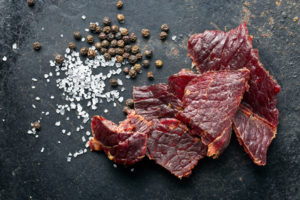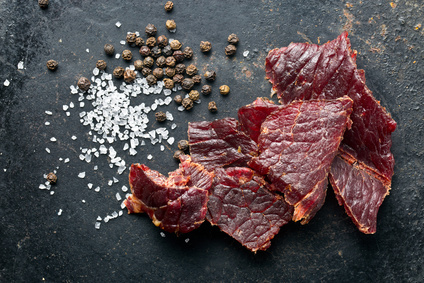Beef jerky is nothing more than dried meat, a shelf stable and nutritious, tasty treat. As moisture is removed, flavours concentrate, and any additional seasonings added to the meat take on a life of their own. Making beef jerky at home is an incredibly simple process, and requires no special equipment. Beef jerky can be stored for long periods of time without going bad and makes for a healthy, tasty snack anytime. Most people think beef jerky is only found in hermetically sealed bags in the grocery store, however making jerky at home, out of any meat, is accomplished with just a few steps and may be tailored to any taste you prefer, from smoky, to sweet, to spicy.
Before modern food processing, people made jerky out of any available meat, with no more than the sun or a campfire. As long as the meat is lean and prepared properly, it can easily be made into jerky. These days, a person can better tailor the results to any taste preference, and making jerky at home is as easy as preparing the meat, marinating it and setting it out to dry. These days, jerky is surprisingly popular, and every grocery store seems to carry some.
Store bought jerky can be an expensive item, however, and often the meat has been treated with additives. Also, any time you buy a prepared item at the store, you should expect to pay a premium for homemade items. An easy way to keep costs down, and ensure your jerky is just the way you want it, is to make it yourself. Jerky is also an easy way to preserve game meat such as venison or elk, which many people may hunt and find themselves with an abundance of meat.
Making jerky at home is easy. There are a few simple rules of which you should be aware to ensure both a safe and tasty product.

Most importantly, the meat should be lean. Fatty meat will go rancid and will not dry properly. Fat in the meat will result in a subpar product that won’t last very long out of the refrigerator (or even in it). Commonly, beef is used for jerky, in which case the best cuts to use are flank steak or round steak. Various game meats such as buffalo, elk, venison, caribou, and many others can also be used as long as lean cuts are chosen.
Some people swear by a dehydrator, which is a multi-tasker that can be used for much more than just drying meat. While a dehydrator can make excellent jerky, it is by no means necessary and an oven will easily suffice. A smoker can also make excellent jerky while imparting a stronger smoky taste, which many people appreciate. Sun drying is possible, but risky if proper safety measures are not taken, and can also take a much longer time to dry your meat effectively.
The easiest way to prepare the meat is by freezing it to the point of firmness but while it is not yet fully frozen. Cut the meat into strips no more than a quarter of an inch thick, half to three-quarters of an inch wide, and six to eight inches long for the perfect working size. You should cut the meat across the grain to ensure a properly finished texture, and again, make sure that all visible fat and gristle has been removed.
Seasonings are multiple and varied. In the olden days, beef was merely treated with salt and pepper and dried, which actually results in quite a satisfying end product. Meat is more commonly marinated these days, however, but there are still many dry rubs and other methods used that can make great beef jerky. Some folks engage in what is called a ‘quick cook’ method to start the process, whereby the meat strips are dropped in a pot of boiling water for a minute or two, which may kill any bacteria that may be on the meat and prepares the meat for a dry rub. While this is one method, often simply marinating the meat for a period of time results in more depth of flavour and is just as safe; however, both choices produce tasty beef jerky.
Making beef jerky
Most dehydrators will come with instructions for drying jerky, and they usually vary from machine to machine. For most people, the oven is a convenient way of making jerky at home, and is simple and readily available. For this, you will need a wire rack for the meat to dry on and a cookie sheet or low pan underneath to catch the drippings. Generally speaking, set your oven to 140 degrees and let it get to temperature. Prepare and marinate the meat according to your instructions (a great, simple beef jerky recipe will follow this article). Place the strips of meat on the wire rack and place in the oven above the sheet or pan and leave the door of the oven open a crack. The beef jerky should be ready in six to eight hours, and you will know when it is done when it has turned very dark, and when it is bent, it will slightly crack but not break.
If you happen to have a smoker, this is a good option as well since the additional smoke flavor from the smoker will enhance the taste of the jerky in a way that liquid smoke just can’t. Only a small handful of coals should be fine or eight bricks of charcoal if you don’t have any wood handy. Remember to keep the heat down to about 140 degrees as you are not trying to cook the beef, just dry it out. You may have to add some coals as time goes on, as it should take six to eight hours for the beef jerky to be ready.
Storing Your Jerky
When your jerky has dried, let it cool completely before removing from the rack. Then place it in zip-lock bags or airtight jars. It will keep many weeks in the refrigerator and will last years in the freezer. Just grab a piece for an anytime snack, or put it in a pocket or bag for an on-the-go treat. Beef jerky is simple and inexpensive to make at home, and a highly nutritious treat for anyone, anywhere.
Easy Basic Beef Jerky Marinade:
- 1 1/2 lb Lean Boneless Beef
- 1/4 Cup Soy Sauce
- 1 ts Worcestershire Sauce
- 1/2 tsp Onion Powder
- 1/4 tsp Ground Black Pepper
- 1/4 tsp Garlic Powder
- 1/4 tsp Liquid Smoke
- Vegetable oil cooking spray for rack
In a medium-size glass, stoneware, plastic or stainless steel bowl, combine soy sauce, Worcestershire, onion powder, pepper, garlic powder, and liquid smoke. Stir to dissolve seasonings. Add meat and mix until all surfaces are thoroughly coated. Cover tightly and refrigerate for at least 6 hours or until next day, stirring occasionally; recorerun -ver tightly after stirring. Dehydrate according to instructions above.








Join the Discussion
Type out your comment here:
You must be logged in to post a comment.